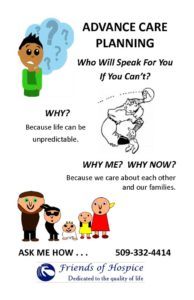Advance-care planning is a thoughtful, intentional, and meaningful process. You can reflect upon and discuss what’s important. Especially if faced with a life-limiting illness or life-threatening injury.
Often people mistakenly think advance-care planning means receiving no care at all. Rather, it means receiving care that matches your wishes. It’s a heartfelt discussion of what life looks like for you and then puts your wishes into a legal document. This guides your family and your healthcare providers in honoring your wishes.
Knowing what you want serves as a caring guide. Loved ones and doctors can give caring in a profound and compassionate manner. This aligns care with your personal choices. It allows you to live in line with your values and wishes.
How did Advance Care Planning come to be?
We live in an amazing world with such innovative medical treatments. We now have more choices than ever before. With this privilege comes the responsibility for making choices never faced by previous generations. We are breaking new ground in our families. Today’s health-care staff talk with us about our health-care rights. We can make our own decisions and wishes known. Are we prepared? Is this the best time to start that first discussion?
With Advance Care Planning, you open up that heartfelt discussion earlier with loved ones. It provides the opportunity for a deeper understanding of what’s important to you. You also develop a document called an Advance Directive.
What is an Advance Directive?
An advance directive is a legal document that puts in writing the type of care you want to receive. If you cannot speak for yourself, who can speak for you. An advance directive means giving direction, in advance of needing it. What type of care do you want? Who can make that decision for you, if you can’t?
What are the two elements of an
Advance Directive?
Durable Power of Attorney for Health Care
This legal document tells who has the power to make health care decisions when you are no longer able to do so. This is a person who is at least 18 years of age, knows you well, and knows your wishes and medical preferences. This person is your Health Care Agent.
Health Care Directive
This is the opportunity for you to put in writing your wishes for the kind of care you would like to receive. You might think of it as “What I would will for myself; my wishes for treatment.”
What is a Health Care Agent?
- They know what’s important about your care and your life values.
- They speak for you when you can’t.
- They share your wishes and beliefs with others.
- They make difficult decisions when necessary and advocate for you.
It’s best to talk with your chosen health care agent. Share your wishes and make sure that person is agreeable to doing what you ask and according to your wishes. Having a proxy is also important in case your primary health care agent is not able.
Can you change your mind?
Yes, at any time. You can appoint a new health care agent and you can change your wishes for the type of care that’s right for you. This is not uncommon. Our life’s circumstances change and what’s important to us changes too. This is not a one-time conversation.
When is the best time to start the conversation?
Hold these conversations when you are healthy is best. Not under a stressful or crisis situation. Then we can share our values and wishes with our family, and hear their concerns too.
But how? Consider a quiet moment of connection. These might include:
- a family reunion
- the death of someone close to you
- the addition of a new baby to the family
- moving
- an annual physical
- a birthday
Sometimes sharing what’s right for you will give your loved one that gentle opening to share what’s right for them.
What’s next? Putting your decisions in writing.
This uncomplicated and comprehensive advance directive includes both the Durable Power of Attorney for Health Care and the Health Care Directive. Click on the link below to print out and complete the form. If you need assistance, please call 509-332-4414.
What about a POLST form?
The Physician’s Orders for Life Sustaining Treatment (POLST) is used as a guide for emergency medical treatment for a person with an advanced life limiting illness and is a set of medical orders. Discussed with, and signed by you and your healthcare provider, you decide upon resuscitation options, comfort measures, limited interventions or full treatment. Your wishes through the POLST, are honored in your home, the hospital and other care settings. Contact your healthcare provider to see if you should have a POLST form.
What is Advance Care Planning vs. Advance Directives?
Advance Care Planning is the conversation.
Meaningful conversations across life’s stages with your loved ones, medical providers, clergy, an ACP facilitator, allowing for a deeper understanding of and honoring of your wishes.
Advance Directives are the written plans or documents.
A Durable Power of Attorney for Health Care is a legal document that names a person who will speak for you when you can’t – your Health Care Agent.
Health Care Directive
Your written instructions to physicians and family about the type of life-sustaining treatment you do or don’t want.
Why Advance Care Planning is important for all adults.
A process of communication that helps you understand, reflect upon and discuss your goals, values and beliefs for future health care decisions.
What it Involves – 3 Decisions
1. Choosing a decision maker (Health Care Agent).
2. Discussing your goals for care when there is little chance you will recover the ability to know who you are, where you are, or who you are with.
3. Identifying the personal, cultural or religious beliefs that may affect life-sustaining treatment decisions.
How to choose someone to be your Health Care Agent.
1. Is this person willing to be my health care agent?
2. Does he or she understand my preferences?
3. Will he or she follow my preferences?
4. Can he or she make difficult decisions in a stressful situation?
Putting your wishes in writing.
Complete a Whitman County Advance Directive
Keep one for yourself and provide copies to:
Your primary health care provider/hospital.
Your health care agent and alternates.
Others—loved ones, clergy, attorney.
Need Advance Care Planning Tips
and Tools?
Honoring Choices Pacific Northwest
Honoring Choices Pacific Northwest (PNW) has partnered with several supportive organizations. They provide necessary resources to make a difference for individuals in the Pacific Northwest. The Honoring Choices Pacific Northwest offers a website that is a comprehensive portal of resources from communities across the state.
The above is for informational purposes only.
Looking For The Right Forms?
Honoring Choices Pacific Northwest Advance Directive
This uncomplicated and comprehensive advance directive includes both the Durable Power of Attorney for Health Care and the Health Care Directive. Print and fill it out. If you need one mailed to you contact us at 509-332-4414.
Aging with Dignity Five Wishes Advance Directive Form
This advance directive has been around since 1997 and is user friendly and easy to complete. It includes both the Power of Attorney for Health Care and the Living Will.
Washington Physician Orders for Life Sustaining Treatment (POLST)
This Washington form is a guide for emergency medical treatment for a person with an advanced life limiting illness and is a set of medical orders. Discussed with, and signed by you and your healthcare provider, you decide upon resuscitation options, comfort measures, limited interventions or full treatment.
Idaho Physician Orders for Scope of Treatment POST
Idaho State’s version of the POLST form.
Who Can Help?
Whitman County
Call or email to make an appointment for us to address your organization or provide one-on-one advance care planning facilitation.
Friends of Hospice
Nikki Nolt
509-332-4414
nikki.nolt@friendsofhospice.net
Pullman Regional Hospital
Social Work 509-336-7556
socialwork@pullmanregional.org
Whitman Hospital and Medical Center Social Services
Susan Hunt
509-397-3435, Ext 354
susan.hunt@whmc.org
Your healthcare provider, clergy, and personal attorney could also be of assistance.
This website is for informational purposes only. It is not intended to provide medical or legal advice.


